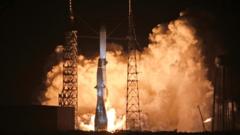The recent launch of Blue Origin's New Glenn rocket signifies a pivotal moment in the commercial space race against Elon Musk’s SpaceX. While Blue Origin faces challenges, this launch indicates a potential for increased competition, aiming to lower costs and expand satellite services.
New Glenn Rocket Launch Puts Jeff Bezos in Space Race Against Elon Musk

New Glenn Rocket Launch Puts Jeff Bezos in Space Race Against Elon Musk
Jeff Bezos's Blue Origin successfully launched its first New Glenn rocket into orbit, marking a significant entry into the competitive space market dominated by Elon Musk's SpaceX.
Jeff Bezos's ambition to challenge Elon Musk's dominance in space took a notable leap as Blue Origin successfully launched its New Glenn rocket into orbit from Cape Canaveral Space Force Station in Florida at 02:02 local time. This marks a strategic move by the Amazon founder's space company in their quest to compete in the burgeoning commercial space industry.
As the New Glenn rocket soared into the sky, it highlighted a fierce rivalry between the world’s two wealthiest individuals, both vying not only to develop larger and more capable rockets but also to establish a foothold in various sectors such as satellite deployment, private space stations, and lunar tourism. Immediately following the launch, Musk extended congratulations to Bezos, offering encouragement on a successful first attempt to reach orbit.
Dave Limp, CEO of Blue Origin, expressed pride in the team's achievement, stating, "We'll learn a lot from today and try again at our next launch this spring." Despite this milestone, the company faced setbacks, notably losing the rocket's main booster during an attempt to recover it in the Atlantic Ocean, which was intended for reuse in future missions.
Introduced as a more powerful alternative to SpaceX's Falcon 9, New Glenn is designed to carry heavier payloads, bolstering Bezos's ambitions in the satellite internet market through Project Kuiper. This initiative aims to deploy an extensive network of low-earth orbit satellites, directly competing with Musk's established Starlink service.
Celebrating 25 years since its inception, Blue Origin has made strides with its reusable New Shepard rocket but remains in the shadows compared to SpaceX, which executed 134 launches last year. The disparities in launch frequency and technological advancement have propelled SpaceX ahead, particularly with the anticipated seventh test flight of their next-gen Starship, set to be even larger than New Glenn.
Experts suggest that successful launches from both companies could spark real competition, ultimately driving innovation and cost reductions in the industry. As the U.S. government increases its reliance on private sector partnerships for space missions, the dynamics between Musk's and Bezos's companies could reshape the future of space exploration.


















